Mobility
Durham, NC Moving ahead with High-Profile Projects
Durham City Council members may be ready to take on new debt to fund a list of big-ticket parks and transportation projects which would help keep pace with growth and enhance the community.
How the Twin Cities Transports its Aging Population
Dave Beal provides thorough coverage of the demographic and geographic challenges facing transportation for the aging in the Twin Cities region, where the need for such services is increasing as the population ages.
Explaining the Connections between Physical Mobility and Economic Mobility
A new post by Danielle Kurtzleben explains the complicated mix of infrastructure considerations that must be in place for transportation to benefit economic mobility.
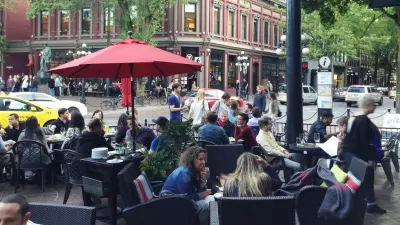
Let's Make Sticky Streets for People!
As cities work hard to evolve their perspective on the role of streets as public places in smarter city-making, remember this: Good cities know that streets move people, not just cars. Great cities know that streets are places to linger and enjoy.
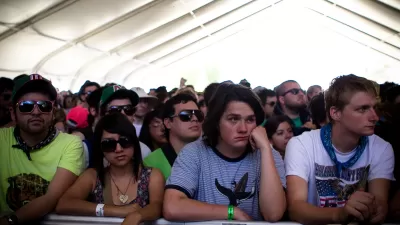
Are Millennials Hiding in their Parents' Basements?
Recent studies have found that trends born of the Great Recession have left Millennials stuck in place. A recent article places the current milieu in context by comparing historic rates of mobility.
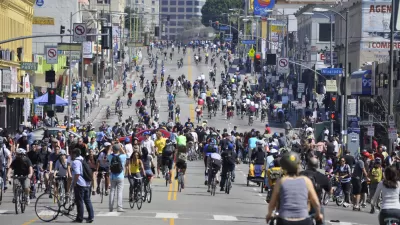
Mobility in Cities is About Space - Proven Powerfully in Pictures!
The biggest mobility challenge in cities isn't about what comes out of a car's tailpipe - it's about the massive amount of space that cars demand. Space to drive in, and space to park in. When explaining this, these pictures are worth 1000 words.
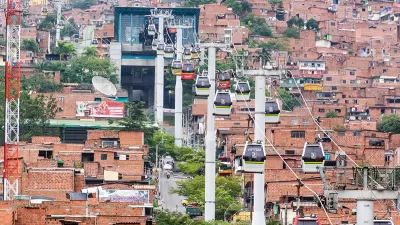
3 Reasons We Should Pay Attention to Medellín
Medellín has been called the most innovative city in the world, and recently hosted the World Urban Forum WUF7 to huge acclaim. It has taken back the city's public realm, found simple solutions to complex problems, and emphasized a "City for Life."
Urban Planning Fundamental: Facilitate a Strong Labor Market
Wendell Cox reviews a new working paper by Alain Bertaud called “Cities as Labor Markets.” Cox calls the lesson contained therein “Urban Planning 101” and a “much needed midcourse correction to urban planning around the world.”
Plan for Nation's Largest BRT Network Approved for Suburban D.C.
This week, the Montgomery County Council approved an ambitious, but controversial, plan to create a 10-route, 81-mile Bus Rapid Transit network in D.C.'s northern suburbs to meet the area's mobility needs and support its sustainable growth.
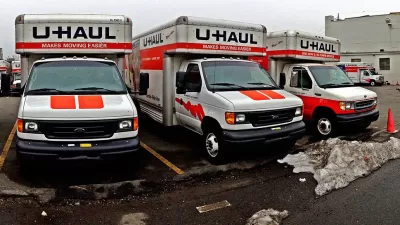
Why Aren't Americans Moving?
Four years after the Great Recession technically ended, the rate at which Americans are choosing to relocate continues to decline and is now at historic lows. What is causing this long-term trend?
As Economic Recovery Falters, More Americans Stay Put
According to Jed Kolko, Trulia’s Chief Economist, recent census mobility figures reveal the mixed nature of America’s economic recovery.
Improving Mobility Requires a Multimodal Consideration of Congestion
As urban populations increase and drivers seek to escape crowded commutes, America's urban transit systems are becoming increasingly congested. For TDM professionals to improve mobility for all, they must first change how they conceive of congestion.
Forgotten Freight Demands Frighten Transportation Planners
While much of the current discussion in planning centers on decreasing road capacity to promote greater pedestrian mobility, Eric Jaffe wonders if we are thinking enough about the critical and complex task of moving freight.
Applying the Brakes to the Streetcar Revival
With Los Angeles, Charlotte, Washington D.C. and many more cities hoping on board, seats are filling up quickly on America's streetcar bandwagon. However, experts caution gung ho cities about unreal expectations for improving mobility.
Critiquing the "Urban Mobility Report"
The "Urban Mobility Report" produces widely-cited congestion cost estimates. It is biased in various ways that exaggerate congestion costs and roadway expansion benefits. Few users of these cost estimates seem aware of these problems.
Why are Americans Preferring to Stay Put?
Americans are less mobile than they were decades ago and it's unclear why. Possible explanations include the recession, habits based on family make-up, as well as telecommuting and job trends, but none of these proposed reasons can be easily proven.
Toward More Comprehensive Understanding of Traffic Congestion
Conventional planning tends to consider traffic congestion asignificant cost and roadway expansion the preferred solution. It evaluates transport system performance based on indicators such as roadway Level of Service (LOS) and peak-period traffic
Considering A Car-Free L.A.
New ideas are emerging to address the mobility issues faced by cities. One specific project focuses on the epicenter of congested America: Los Angeles.
Mobility Lacking in Toronto
Toronto's lack of focus on transportation planning and the absence of a national strategy for mobility is turning the city into a messy gridlock, according to this column.
Urban Mobility, 2025
This post from This Big City looks at how transportation needs to evolve, and some of the ways it could in the near future.
Pagination
Urban Design for Planners 1: Software Tools
This six-course series explores essential urban design concepts using open source software and equips planners with the tools they need to participate fully in the urban design process.
Planning for Universal Design
Learn the tools for implementing Universal Design in planning regulations.
Heyer Gruel & Associates PA
JM Goldson LLC
Custer County Colorado
City of Camden Redevelopment Agency
City of Astoria
Transportation Research & Education Center (TREC) at Portland State University
Camden Redevelopment Agency
City of Claremont
Municipality of Princeton (NJ)


































